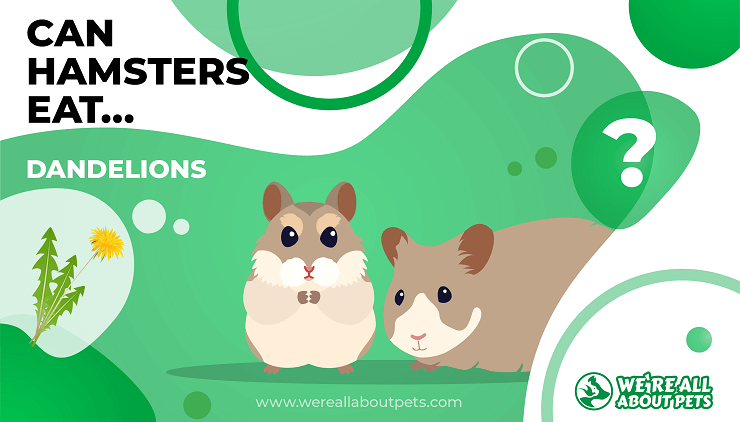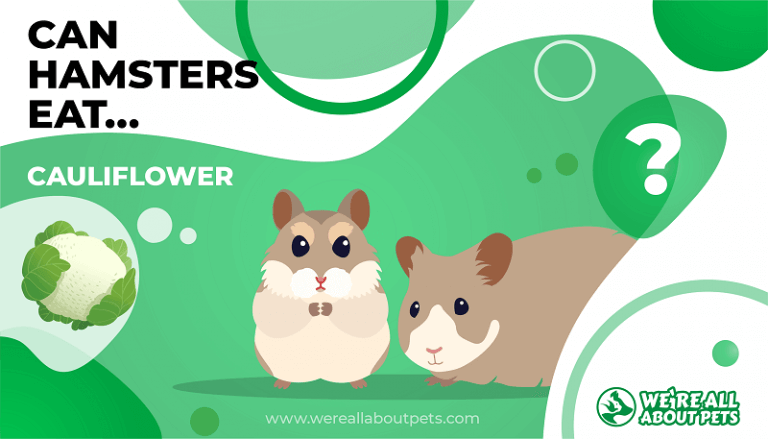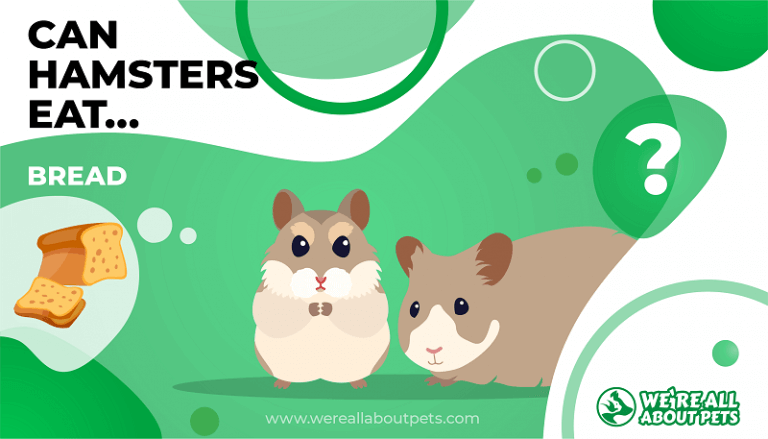Can Hamsters Eat Cheese?
This page contains affiliate links. We may earn money or products from the companies mentioned in this post through our independently chosen links, which earn us a commission. Learn More
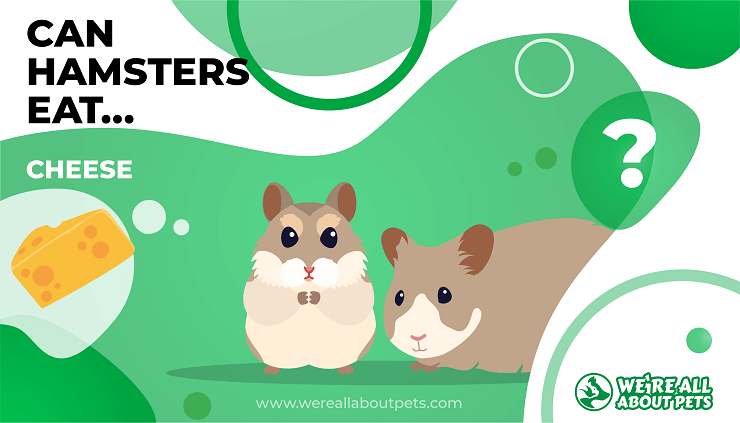
If you’re anything like we are, you look for items that you can share with your pets whenever it’s time to shop for groceries. Cheese is a tasty addition to many of your own meals, but this doesn’t automatically mean your hamster can have it.
So the question is, is it OK to give a hamster cheese? And, if hamsters can eat cheese, what kind can they have and how much should they eat at a time?
Great news for your hamster: It’s perfectly fine for you to share a tiny bit of cheese with them. There’s a lot more you should know before you give this savory, salty food to your fluffy friend, though.
Keep reading: Our quick guide to cheese for hamsters has all the answers!
Cheese Nutritional Facts
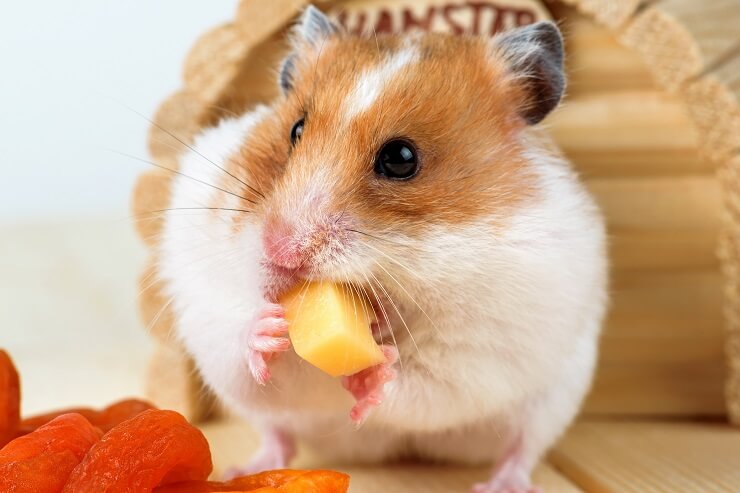
Cheese has been a favorite food for centuries, partly for its unique flavors, and partly for its nutrition. Since different types of cheese have different nutritional profiles, our overview covers the main nutrients in cheese rather than offering specific details.
Many cheeses are good sources of:
- protein
- fat
- omega-3 fatty acids (grass-fed varieties only)
- calcium
- magnesium
- phosphorus
- vitamin A
- B vitamins
Can Hamsters Have Cheese?
Yes! While rabbits and guinea pigs can’t eat cheese, this food is OK for hamsters, so long as you offer the right kind in moderation.
There are certain types of cheese hamsters can’t have. Don’t give your hamster any cheese that’s labeled as “processed cheese food” and avoid cheese flavored snacks such as cheese puffs. Cheese flavored treats made for hamsters are perfectly fine.
Last but not least, never give your hamster blue cheese. Blue cheese is toxic to hamsters and other rodents , so it should not be part of your pet’s menu.
Is Cheese Good For Hamsters?
Since it is such a Good source of protein, calcium, add minerals, cheese can benefit your hamster. Just remember not to overdo it and make cheese an occasional treat instead of a regular addition to your hamsters diet.
Do Hamsters Like Cheese?
Most hamsters go crazy for the savory flavor of cheese. Of course, some hamsters may not like it. The best way to find out if your hamster likes cheese is to offer them a tiny piece and see how they respond.
How Much Cheese Can A Hamster Eat?
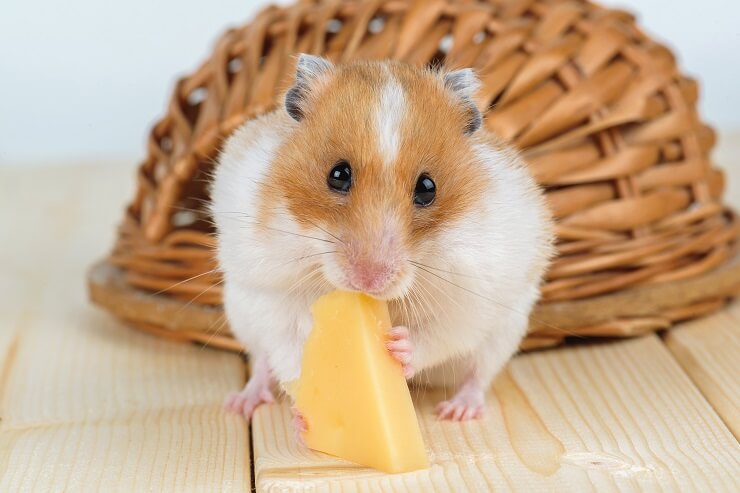
Is there such a thing as too much cheese? Unfortunately, the answer is yes.
Here’s how much cheese a to feed your hamster:
| Age | Amount |
| Baby hamster | None |
| Adult hamster | 1/2 inch cube of cheese, ½ teaspoon cottage cheese, or 1 teaspoon loosely packed shredded cheese |
Larger hamsters can have more cheese than smaller breeds so be sure to gauge your pet’s serving size carefully; for example, a tiny Dwarf hamster can have about half as much cheese as a Syrian hamster can eat.
It’s very important to introduce new foods to your hamster gradually rather than offering them a full serving all at once. The first time you give your hamster cheese, give them only about half the amount that’s recommended for their size. Watch them carefully for at least 12 hours and don’t offer cheese again if they show any signs of digestive upset. So long as everything is normal, you can offer your hamster cheese again in a few days, gradually increasing their serving size until they are eating the full amount.
How Often Can A Hamster Eat Cheese?
If you and your hammy both like cheese and you tend to enjoy it often, you can feed your hamster cheese up to two times per week. Because cheese is high in fat and salt, it’s not something your hamster should eat every day.
The Correct Diet Is Important
What should your hamster be eating, other than snacks such as cheese?
Most people think that hamsters are herbivores, but the truth is, these adorable fluffballs can be pretty fierce: In the wild, hamsters hunt for sources of nutritious animal protein, preferring big insects such as crickets and beetles, and enjoying worms and small amphibians when they can find them. They’ll go crazy for a bit of hard-boiled egg, a tiny bit of cooked chicken, or a few dried mealworms if you feel like offering them.
Luckily for busy hamster parents, there’s no need to go to extremes: High-quality hamster food contains all the nutrients your pet needs.
Besides a daily serving of hamster pellets and optional protein treats, you’ll want to offer:
- Unlimited amount of fresh Timothy hay for nibbling. Your pet will use it in tunneling and nesting projects to spruce up their hamster habitat, too.
- About a teaspoon of bird seed per week.
- Small amounts of fresh vegetables and tiny bits of fruit – just enough to keep things interesting. Always check serving sizes when looking for new foods to offer your hammy.
- 24/7 supply of clean, fresh water; be sure to take a minute to rinse and refill your hamster’s drinking bottle every day.
Last but just as important as great nutrition, your little friend has a biological need to chew. It’s up to you to ensure that your hamster has constant access to safe hamster toys and other chewable items.
Natural options like hard hay cubes, untreated coconut shell, untreated softwood branches, and unbleached loofah slices are great for satisfying that need and keeping your hamster’s teeth from becoming overgrown and painful.
What Are Other Healthy Alternatives To Cheese In A Hamster’s Diet?
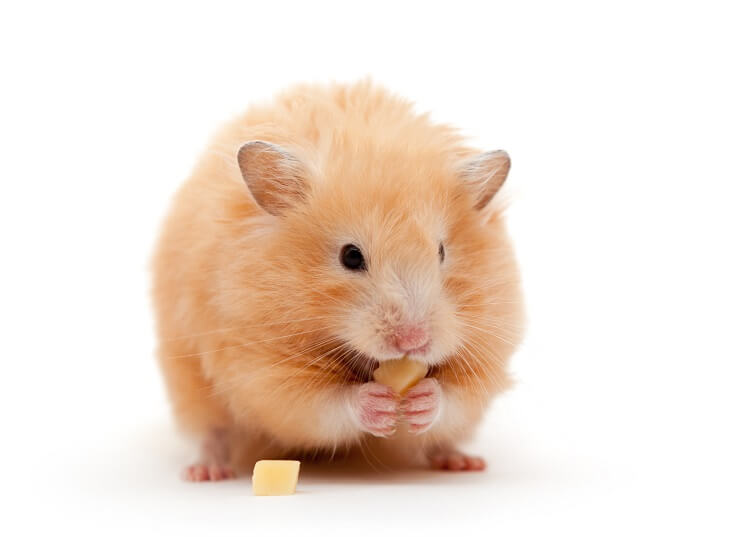
Since hamsters can have just a tiny bit of cheese, what other treats can you give the? The good news is, you have lots of options. Pet hamsters enjoy a wide variety of fruits and veggies, including items that you might like, too.
This list includes a handful of veggies hamsters like most:
- baby corn
- sweet corn
- artichoke
- beets
- beet tops
- green beans
- summer squash
- winter squash
- cucumber
- celery
- pumpkin
- bell pepper
- zucchini
- tomato
- cabbage
- basil
- mint
- parsley
- carrot
- carrot tops
- sweet potato
- cilantro
- romaine
- potato (cooked only)
- sprouts
- arugula
- swiss chard
- spinach
- endive
- escarole
- butter lettuce
- bibb lettuce
- rocket
- buttercrunch lettuce
- parsnip
- broccoli
- broccolini
- cauliflower
- okra
- bok choy
- yu choy
- watercress
This is a fairly long list but it’s far from complete, as there are so many different foods hamsters can eat.
The best way to ensure your hamster’s safety while offering a variety of foods is to spend a little time researching all additions to their menu. It’s the easiest way find out if certain items are safe, plus you’ll learn how much your pet can have.
For now, why not try giving your hamster cheese (just a tiny nibble!) They’re likely to respond favorably, and once you’ve made the initial introduction, you’ll find that occasional cheese treats give you one more way to make your hamster’s life more interesting – and a little bit more flavorful!
Frequently Asked Questions
Is cheese safe for hamsters?
Yes! So long as you offer the right kind in tiny amounts, it’s OK to give cheese to a hamster.
Can cheese make my hamster sick?
Yes, but it isn’t likely unless you offer far too much. Cheese can cause gastric distress in hamsters that aren’t yet accustomed to it, so take a very careful approach and introduce it or any other new food gradually.
Can hamsters have cheese puffs?
No. Cheese puffs and other processed snacks aren’t good for your hamster, and can contribute to serious illnesses over time. Stick to all-natural foods and avoid things that contain lots of additives, salt, artificial flavors, artificial colors, and preservatives.






